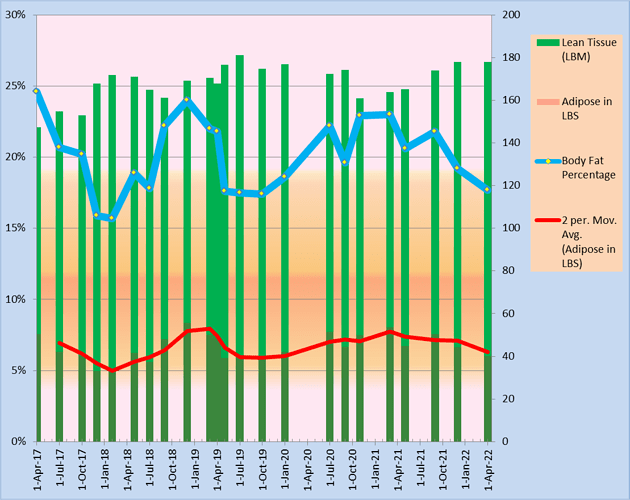@PaulL Yes off course, so my plan is to stop tracking ketones once I run out of the strips that I already have and after 90 days, stop tracking glucose as well, since I am experimenting with different foods that I like to eat. For example, I added 1/4 onion in my one meal a day and did not see any impact the following day on the BG.
Very low Glucose and High Ketones at the end of first week?
As far as exercise is concerned, numerous studies have shown that it is not very useful for shedding excess fat, except as it promotes mitochondrial health and thus indirectly promotes an increase in fatty-acid metabolism. But a ketogenic diet can achieve that without exercise, too.
Retaining muscle is a different matter, of course, and the exercise will definitely help there. Be sure to eat at the high end of the recommended protein range, perhaps even going as high as 2 g/kg of lean mass.
I don’t see how calorie restriction helps, because it lowers energy expenditure, and you need extra energy intake to feed all that exercise. Between restricting calories and the exercise, you have a great need for energy. Your body will not release fat from adipose, even on a ketogenic diet, if it thinks there is a famine going on. The famous follow-up study by Kevin Hall of former contestants on “The Biggest Loser” showed that the strenuous exercise and severe calorie restriction imposed by the show’s producers had resulted in permanent damage to their metabolisms.
@PaulL Actually he mentions it in some of his videos (old ones) when he was a medical student and as a cyclist he was on high carb diet. In one of his interviews he says ( “I was eating only 1500 calories, the rest was coming from body fat”). For me eating to satiety would not work as I don’t know exactly what it means in reality and since I am new to Keto, first goal is to get used to keto diet. And my long term goal to to continue to build muscle, so essentially tracking every calorie and every macro (for the next 90 days) is a must for me, as I would be adjusting these upwards as I meet my goals of fat loss and then focus on muscle gain with adjusting protein and fat %ages.
Our carbohydrate threshold is very individual, and it depends to a large degree on how insulin-resistant we are. Our recommendation is to stay under 20 g/day until you are fat-adapted, at which point you can start to see if a higher carb limit will still allow you to stay in ketosis. The exact limit depends on your insulin response, since insulin above a certain amount inhibits ketogenesis. As we become less insulin-resistant, it takes less insulin to remove excess glucose from the blood stream, so the likelihood of inhibiting ketogenesis is correspondingly less.
But I find that, while I can eat a fair amount of carbohydrate and remain in ketosis, if I exceed a certain level of intake, all my aches and pains start to return, even if I remain ketotic. Since I enjoy waking up without creakiness, and I like being able to go up and down stairs without knee pain, this is a good incentive to keep my carb intake as low as I can.
Of course, the ultimate low-carb diet is carnivore, but I wouldn’t recommend that until well after you become fat-adapted.
@PaulL Great advice here. I will keep it in mind and incorporate in my strategy to keep on gaining muscle and losing fat through this wonderful lifestyle and advice from mentors like yourself.
I believe you are conflating two remarks in your memory. If he was on a high-carb diet, insulin was preventing the action of hormone-sensitive lipase, which has the effect of trapping triglycerides in adipose tissue, preventing them from being metabolised (I learned this from various Phinney videos). As I recall, the difference he describes between his carb-burning days and from after he switched to a well-formulated ketogenic diet eaten to satiety, is that in the latter state, he became effectively “bonk-proof” as a cyclist.
Yes, he says that, but he was eating “only 1500 calories” by eating to satiety, which is very different from eating to an intentional caloric deficit. If you allow your body to dictate how much you eat, instead of trying to eat a predetermined amount (even if that amount worked for someone else), you may find yourself eating more than 1500 calories, or less than 1500 calories, depending on how much excess stored fat your body is willing to shed. This is an area in which everyone’s mileage is guaranteed to vary.
As Amber O’Hearn points out: “We need a caloric deficit in order to shed excess fat, but we don’t need to restrict calories in order to achieve such a deficit.” Her point is that the body’s hormonal and metabolic response to the foods we eat trumps the absolute number of calories eaten.
@PaulL Thanks for clearing out another fuzzy argument in my mind (regarding caloric restriction) !!. As I said I only started this journey, so I am learning TONS from this site and YT.
You are going to encounter a large range of opinions, even on keto-friendly sites. On this site, we try to stick as close to the data as we can, but how people interpret data is inevitably influenced by our preconceptions. The best we can do is to try to step out of the received wisdom, but that is very difficult. Mainstream scientists are stuck in an invalid paradigm (so far as I can tell, anyway), but that doesn’t meant (a) that they are always wrong, or (b) that those of us who see the flaws in their thinking are free from flaws in our own.
So although I want you to trust everything I tell you, you are probably better off taking my thoughts with a grain of salt (how large or small a grain is up to you). 



@Jamesbrawn007 Thanks. It make me feel sooo much better that you understand (a contrarian position like me). In my all-time favorite movie, The Italian Job, Donald Sutherland says, " I trust everyone. I just don’t trust the devil in them". So while attempting to lose weight in the past, I trusted the little devil in me and did not track. But that SOB took me down to the path of overeating. Now the rule of the game is to prep my one meal with loving care, and using the daily accumulating data, bring the calories as close to 1500 as possible. Then add all the info in my trusted Spread sheet ( I know I know, I am still old school in the days of myfitnesspal app). One trick I do is a promise to myself that before anything goes in my mouth, it goes in my spreadsheet. And after I calculate the daily totals, I color the following row with RED. For me that is the thin red line I will not cross. Also, I did not mention, but I do take Apple Cider Vinegar (with a pinch of salt, first thing in the morning and also during the day if I feel like. That probably also contributes to low BG).
@PaulL Keep them coming !!. I am actually taking copious notes from the wealth of info you provided
Yes and that’s what freaked me out too. I had in-fact started to clean up my diet 6 weeks prior and brought it down to one meal a day (still with fruit and carbs) and then switched to < 20 gms / day of carbs and less than 1500 cals per day. Also i think, dailyone hour of intense workout (including 20 min HIIT) played a part too. I strictly followed zero calories rule for 23 hrs. Anyways, I have started back up and will see where I land this time. The overall experience (minus the fear factor) is fantastic though. And i got those numbers on Day 8. (I mean very low sugar and very high Ketones)
If you stay keto long enough, you should find your blood sugar goes up after (most, many) exercise, which should lead to higher overall blood glucose. You’re creating your own glucose for things like glycogen replenishment. Meanwhile, if you eat carbs, you’ll use those instead, and that will tend to lower your blood sugar.
There’s a never-ending thread on this if you want more info.
@ctviggen Thanks Bob for the heads up. So far all of my research has led me to be a firm believer that Ketogenic diet is literally the best diet and lifestyle, so my commitment is to be a life long follower as long as my body agrees with it and I continue to add a decent amount of muscle each year, since I believe adding muscle as we age is also critical to vital health. I am not looking to be a body builder, rather a strong athlete with daily min 20 mins of intense cardio. So I will be continuously adjusting protein and fat. Please do share the link and THANKS !!
Jason continuously drops the amount of fasting days to do without medical supervision. I think this is not based on medicine or experience but what is allowable within legal limits.
Phinney was not hardcore against all fasting and allowed that IF and 48 hour fasts had their place. I do not think that contradicts anything he has said publicly. Here in the Two Edged Sword he takes a a firmer stance https://youtu.be/_1r8ffLDFcE
Phinney argued that my gain of 33 pounds per Dexdascan lean body gain could have been GREATER had I not fasted 5 days every 4-6 weeks. I was 56 at the time and I found his argument rather superfluous. Anyone who gains 10 pounds in lean annually is doing phenomenally let alone a 56 year old male.
When I told him it was difficult for him to refute that lean mass always accompanies extended fasting he called me “an outlier” and said I need to do what he has done, gather the resources, conduct a study and prove it and chuckled as he said it.
@PaulL Thanks Paul. This is really very helpful and broadening my horizon about future strategy to follow in pursuit of muscle building and getting fat levels to a healthy %ages. Currently browsing Marks Website with such a wealth of data !!
Until you try carnivore…KETO AF ( Keto Animal Foods WTF did you think I meant?) 
@marklifestyle Not sure if the comment is directed towards me, but please keep profanity out of any of your comments. It is simply rude and disrespectful, no matter whatever your success record is on any type of diet.
I have never measured my ketones and TBH the science of this is not something I want to investigate. But… I appreciate those who do because I benefit from what you know.
I can say that when I step outside my usual foods, I feel it almost immediately. Headaches, sore and swollen joints, lethargy, and tummy issues. That’s my version of scientific proof. Lol.
Sorry, but AF is not profanity. Nor is WTF. And a little levity here is par for the course. People like @marklifestyle are valuable contributors and follow the forum rules. No reason to take offense where none is intended.
I believe Keto AF was coined by Amber O’Hearn, and it’s her idea of having people place an emphasis on animal fat (first), then meat. She believes it helps some people, and I have seen reports that - for some folks – it works really well.

